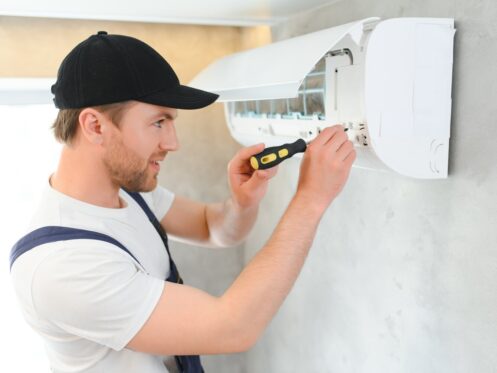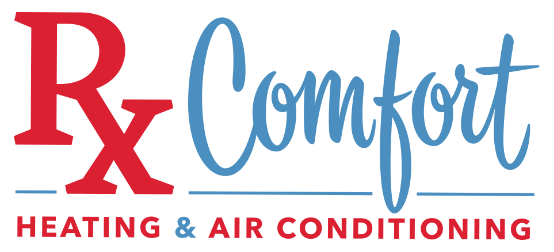Maintaining a comfortable and efficient living space is likely one of your top priorities as a homeowner. A critical component of keeping your home comfortable is ensuring that your air conditioning system is in peak working condition, especially during the sweltering summer months. Whether you’re dealing with minor issues or major malfunctions, having a trusted HVAC contractor by your side can make all the difference.
Read Rx Comfort Heating & Air Conditioning’s guide to learn about the various aspects of air conditioning repair, signs that your system may need professional attention and valuable tips for maintaining your HVAC system to prolong its lifespan and efficiency.
1. Regularly Inspect and Replace Air Filters
One of the most crucial aspects of air conditioning maintenance is regularly inspecting and replacing the air filters. Clogged filters restrict airflow, forcing your system to work harder and consume more energy, ultimately resulting in higher utility bills. We recommend checking your air filters at least once a month and replacing them every 1-3 months, depending on the filter manufacturer’s guidelines and the household’s usage.
2. Clean and Inspect Air Conditioning Coils
Over time, debris and dirt can accumulate on your air conditioner’s evaporator and condenser coils. Dirty coils can lead to reduced heat transfer and increased energy consumption, putting strain on the system and potentially shortening its lifespan. To maintain optimal performance, perform routine inspections and clean the coils as needed. It’s generally recommended to clean the coils annually, but depending on the environment and usage, your system may require more frequent cleaning.
3. Assess and Maintain the Refrigerant Level
Your air conditioning system relies on the appropriate amount of refrigerant to cool your home efficiently. Insufficient refrigerant levels can result in your air conditioner struggling to keep your home at the desired temperature, while excess refrigerant may cause poor cooling performance. Maintaining the right refrigerant level for your system and fixing any potential leaks is crucial. We recommend scheduling a professional inspection and refrigerant recharge if necessary, typically annually or as your system’s performance dictates.
4. Inspect the Electrical Components and Connections
Regularly inspecting your air conditioner’s electrical components and connections is essential for maintaining safe, efficient operation. Over time, connections can loosen, and components can wear out or malfunction. Inspect and tighten all electrical connections, and replace any damaged components, such as circuit breakers, capacitors, relays, and contactors. Additionally, pay attention to unusual noises or uneven cooling, as these could indicate electrical issues. Since working with electricity can be dangerous, we recommend hiring a professional if adjustments or repairs are needed.
5. Test the Thermostat and Control Systems
Your thermostat plays a significant role in efficiently controlling your air conditioning system. Ensure your thermostat is properly calibrated and test its accuracy by setting the temperature a few degrees below the current room temperature. If the system does not respond, it may indicate a problem with the thermostat or its wiring. Upgrading to a programmable or smart thermostat can provide greater control over your cooling system, potentially saving energy and enhancing comfort.
6. Inspect and Clean the Drainage System
The air conditioning system includes a drainage system, typically consisting of a drain pan and condensate drain line, that collects and disposes of the moisture generated during the cooling process. Over time, this system can clog with debris and mold, potentially causing water damage and reducing your air conditioner’s efficiency. Inspect and clean the drainage system regularly, paying close attention during periods of high humidity. If you notice water pooling or leaks around your indoor unit, it may signify a clogged or damaged drainage system that requires professional attention.
7. Check and Clean the Ductwork
Your air conditioner relies on a network of ducts to distribute cool air evenly throughout your home. However, leaky, dirty, or poorly insulated ductwork can cause uneven cooling, increased energy consumption, and decreased indoor air quality. Inspect your ductwork for dust, debris, and mold, and clean it as needed. Additionally, check for any signs of leaks or gaps and seal them properly to maintain optimal efficiency. Professional duct cleaning and sealing services can help ensure your air conditioning system is delivering cool air efficiently and maintaining a healthy indoor environment.
8. Ensure Proper Airflow and System Lubrication
Proper airflow is crucial to your air conditioning system’s efficiency. Inspect and clean the supply and return vents in your home to ensure they are unobstructed and allow for sufficient air circulation. Additionally, examine and lubricate all moving parts within your system, such as the fan motor and blower, to prevent unnecessary friction and wear. Regular lubrication can extend the life of these components, ultimately contributing to the overall longevity of your air conditioning system.
Keep Your Home Comfortable with Expert HVAC Services
Following this essential air conditioning repair checklist for homeowners is undoubtedly advantageous. It helps maintain optimal system performance and energy efficiency and prolongs the life of your cooling system. While some tasks can be performed independently, many require the expertise of trained professionals.
Entrust your HVAC needs to the experts at Rx Comfort Heating & Air Conditioning. Serving the greater Grand Rapids area, we proudly offer top-quality heating and air conditioning repairs, installations, and maintenance services to help keep your home comfortable year-round. Don’t let air conditioning issues leave you in a sweltering home – contact us today to schedule an appointment, and let our skilled technicians ensure your air conditioning system operates at its best.






